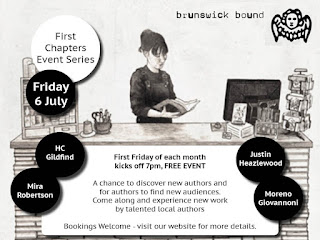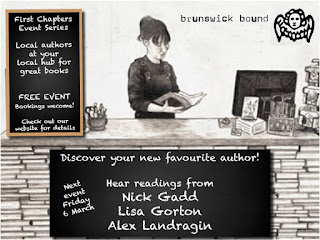First Chapters Q&A with Jay Carmichael
Jay Carmichael is a writer and editor. His first novel, Ironbark, was shortlisted for the Victorian Premier's Award for an Unpublished Manuscript in 2016.
His writing has been published by beyondblue and appeared widely in print and online, including in Overland, The Guardian, SBS and The Telling Tree project.
Jay will be reading from Ironbark at First Chapters on Friday 5 October.
1. Brunswick Bound has asked you to read a
chapter from your published work. Tell us what we can expect from the
chapter you have chosen?
The
section I’ll be reading from my debut novel, Ironbark, appears later on in the text when there’s a change from third-person
to first-person point of view: this is the novel’s protagonist, Markus, addressing
his best friend, Grayson.
You
can expect to hear a few things packed into a short space – e.g. climate
change, sexuality, and homophobia. These themes do share a common similarity
between them, and that is that (mostly) we address each of them with silence.
2. How would you describe the kind of books
that you write?
I’ve
only the one book (so far) to describe – Ironbark.
It’s a small, circuitous book that’s less about plot and more about how a young
man growing up gay in a rural town might internalise the world he moves
through. In this case, he is coming to terms with not only the death of his
best friend, but also his own sexuality.
I’m
currently writing my second book, too. It will focus on the relationship
between two gay men in order to examine the unique strain and pressures of
trying to live authentically in the politically and socially repressive time
period of 1930–1950 Australia.
The
similarities between Ironbark and my
second work of fiction are, I think, that I am trying to describe the unique
experiences gay men, in particular, have potentially had at different times
throughout history.
Paul
Jennings’ Un- series, as well as his
collaboration with Morris Gleitzman on Wicked,
were the first books I remember as getting me interested in reading.
The
first book that left an impression on me would have to Ethan Frome by Edith Wharton, which I had to read in year 12.
4. Do you believe that books should answer
life’s big questions?
I’m
only 24, so I don’t really know what ‘life’ means. But I guess if a book can
record bits and pieces of ‘life’ – e.g. the day-to-day pieces – maybe then a
reader can find something in that text, something that says something about
‘life’: how different people live it, experience it, represent it, etc. What
that reader does with the information is not up to me.
5. What’s your go-to solution for writer’s
block?
I
usually eat something and watch a reality TV series, which sounds like a waste
of time but, for me at least, I spend this ‘down’ time vaguely shifting the
writing problem around in my head. I trust that my subconscious will know what
it’s doing when I return to writing – I just have to listen out for the clues.
6.
What is your favourite word or phrase?
I
like lots of words and phrases. The only one that I can think of right now is
‘sky-blue space’, which I remember reading in The Art of Fielding by Chad Harbach. For me, ‘sky-blue space’ has a
mystical potential because, scientifically, it does not precisely exist, yet,
when we look up, there it is.
7. What do you put down as your occupation
when asked?
Editor
– that’s the job that pays my bills J I’d like to put
‘writer’, one day, but for now it’s not something I am able to do as often as
I’d like.
8. What is the question that you hope never
to be asked in an author Q&A?
While
I understand why people might want me to talk about how ‘real’ what I write
about in Ironbark is – e.g. ‘Did you
experience that too?’ or ‘Is that what it was like growing up gay in the bush?’
– I find it hard to relate my experiences to those of Ironbark’s protagonist, Markus. I mean, Ironbark is fiction. Simple as that.
9. What question do you hope you will be
asked and why?
Instead
of asking ‘Did you experience that too?’ or ‘Is that what it was like growing
up gay in the bush?’, it’d be good if people went beyond that to ask things
like: ‘Why is it hard for young people in similar situations to Markus?’ or
‘What are some of the things that make it difficult to be a young gay man?’ or
‘How can we support young people (in general) better?’ or ‘What kinds of
conversations do we need to have that we are currently not having?’
10. Which book that you have read do you
think should be better known or more widely read?
I
did really like The Art of Fielding
by Chad Harbach, but I don’t know how ‘well known’ it is. Some others: At Swim, Two Boys by Jamie O’Neill; Ethan Frome by Edith Wharton (I wouldn’t
say that because it’s a movie the book is any better read); and The Argonauts by Maggie Nelson could be
more widely read.
You can find out more about First Chapters on the Brunswick Bound website. Bookings via Eventbrite.





Comments
Post a Comment